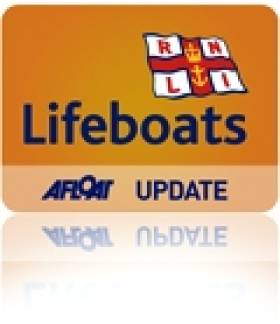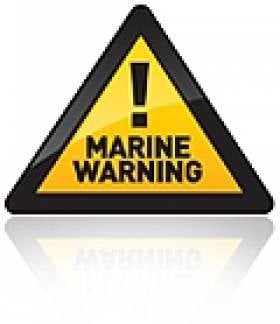Displaying items by tag: Department of Transport Tourism and Sport
#LIFEBOATS - The latest marine notice from the Department of Transport, Tourism and Sport (DTTAS) advises of construction work being carried out on Baltimore Lifeboat Station from today 5 March.
As previously reported on Afloat.ie, the works are part of a €2.6 million State-funded project to conduct essential remedial works at harbours across West Cork this year.
The works - which will be ongoing till mid-October pending weather conditions - will involve piling immediately adjacent to the foreshore on the north-east side of the building, and the deposition of rock to form an armoured breakwater jutting some 80m into Church Strand Bay.
No forseeable impact to mariners in the area is expected, but vessels are in any case requested to proceed slowly and with caution in the approach channel to Church Strand Bay and to give the works a wide berth to avoid wave-wash.
Further details for mariners are included in Marine Notice No 9 of 2012, a PDF of which is available to read and download HERE.
Marine Notice on Pipeline Survey in Celtic Sea
#NEWS UPDATE - The latest Marine Notice from the Department of Transport, Tourism and Sport (DTTAS) advises on a pipeline survey in the Celtic Sea next month.
PSE Kinsale Energy Limited will be commencing the survey of the 24" Gas Export Pipeline on 6 March 2012 using the Marine Institute vessel RV Celtic Voyager (call sign EIQN). The survey is expected to last 1 to 2 days, depending on weather conditions.
The survey will take place along the existing pipeline route in the Celtic Sea, between the shoreline at Inch Beach in Co Cork and gas platform 'Alpha'.
The RV Celtic Voyager will display appropriate lights and signals, and will be towing side scan sonar with cables of up to 200m long. A Radio Navigation Warning will be issued via the Irish Coast Guard (schedule Bravo, four times a day) prior to the vessel's arrival at the survey area. The vessel will also keep a listening watch on VHF Channel 16.
All vessels, particularly those engaged in fishing, are requested to give the RV Celtic Voyager and her towed equipment a wide berth and keep a sharp lookout in the relevant areas.
Further details for seafarers, including relevant co-ordinates, are included in Marine Notice No 7 of 2012, a PDF of which is available to read and download HERE.
Marine Notice: AFS Convention Comes Into Force January 2012
#NEWS UPDATE - The latest Marine Notice from the Department of Transport, Tourism and Sport (DTTAS) gives notice that the International Convention on the Control of Harmful Ani-Fouling Systems on Ships - known as the AFS Convention - will come into force for Irish-flagged ships on 20 January 2012.
Anti-fouling systems refer to paints or coatings applied to the hulls of vessels to prevent living organisms from attaching to them.
Currently all Irish-flagged ships of 400 gross tonnage and over are required to hold an Anti-Fouling Certificate, issued under Regulation (EC) No 782/2003 of the European Parliament and of the Council.
The new regulations mean that any Irish-flagged ship which holds such a Certificate must replace it with an International Certificate, issued under the AFS Convention.
The new convention applies to three separate groups: any and all ships of 400 gross tonnage and over; all ships (including fishing vessels) of 24 metres or greater in length; and all other vessels.
Details of requirements for these groups are included in Marine Notice No 55 of 2011, a PDF of which is available to read and download HERE.
Marine Notice: Drilling Off South Coast
#MARINE WARNING - The latest Marine Notice from the Department of Transport, Tourism and Sport (DTTAS) advises that offshore drilling has commenced off the south coast.
The semi-submersible drilling unit Arctic III (callsign YJSU9) will be drilling some 65km south of Roches Point, Co Cork, for a period of approximately three months.
The drilling unit will have a dedicated stand-by safety vessel and supply vessel, both listening on VHF channel 16 throughout the project.
All vessels, particularly those involved in fishing, are urged to give the drilling unit and its handling vessels a wide berth of at least 500 metres and to keep a sharp lookout in the area.
Full location co-ordinates and further details are included in Marine Notice No 53 of 2011, a PDF of which is available to read and download HERE.
Notice on Mandatory Training for Navigation by ECDIS
The latest Marine Notice from the Department of Transport, Tourism and Sport details the training requirements for the use of Electronic Chart Display and Information Systems (ECDIS) as a primary means of navigation.
Mandatory carriage requirements for ECDIS will be phased in between 1 July 2012 and 1 July 2018 according to ship size and class. All shipowners, masters and deck officers of merchant and fishing vessels, yachtsmen, nautical colleges and other users are required to complete both generic and ship specific training for the use of ECDIS.
The notice outlines the following as meeting the requirements for generic training:
- A NARAS Operational course completed after 1 January 2005.
- An ECDIS programme based on the IMO Model ECDIS course (1.27) approved by the Irish Maritime Administration.
- An ECDIS programme based on the IMO Model ECDIS course (1.27) approved by the maritime administration of an EU Member State or by a country recognised by Ireland under STCW 78.
As far as ship-specific training, the following areas should be covered in training delivered by the ECDIS manufacturer (computer-based training packages are acceptable):
- familiarisation with available functions
- familiarisation with the menu structure
- display setup
- setting of safety values
- recognition of alarms and malfunction indicators and the actions to be taken
- route planning
- route monitoring
- changing over to backup systems
- loading charts and licenses
- updating of software
Further details are available in Marine Notice No 51 of 2011, available to read or download as a PDF HERE.
Marine Notice: Deployment of Waverider Buoys
The latest Marine Notice from the Department of Transport, Tourism and Sport (DTTAS) advises that two Waverider buoys are set to be deployed off the west coast from tomorrow 10 October.
The buoys will be operational for between 12 and 24 months at two locations, one 6km west of Achillbeg Island, Co Mayo and one 2km north northwest of Captain's Hill, Co Clare. Both have a drift radius of up to 100m.
All vessels in the areas above are requested to give the buoys a wide berth. They will be easily spotted by their spherical shape, bright yellow colour and flash pattern (FL 5, Yellow, every 20 seconds).
Full location co-ordinates and further details are included in Marine Notice No 48 of 2011, a PDF of which is available to read and download HERE.
Marine Notice: Hydrographic Survey off Dundalk
The latest Marine Notice from the DTTAS advises all seafarers near Dundalk Bay and Carlingford Lough to give a wide berth to the hydrographic and oceanographic survey operation in the area this month.
The RV Celtic Voyager (callsign EIQN) will be carrying out survey operations between Kildeel and Clogherhead till 15 September.
The vessel will display lights and markers and will be towing different sensors from time to time with a single cable of up to 100m long.
Deployment of water level recording equipment will be necessary on the seabed at certain locations. These will be marked with appropriate buoys and lights as well as Irish Coast Guard radio notices.
Details of the survey area are included in a PDF of Marine Notice No 44 of 2011, which is available to read or download HERE.
Requirements for Recreational Craft at Tall Ships Races
The latest Marine Notice from the DTTAS includes important information for recreational craft expected to attend the Tall Ships Races in Waterford from 30 June to 3 July.
Race organisers and the Waterford harbour master have issued an approved water safety plan for the marshalling of spectator boats for the time the tall ships are in port and for the start of the race off Hook Head.
Skippers and crew must comply with all instructions and be aware of their obligations under existing maritime legislation (regarding avoidance of collisions, preventing reckless behaviour and ensuring correct safety equipment is on board).
Boat owners intending to visit should contact the harbour master for details on restricted areas and berthing spots via the Port of Waterford website or directly at 051 974 907.
Restrictions are also in place for passenger boats and ships. Only fully licenced vessels with plying limits listing Waterford as a point of departure are allowed to operate during the event. Temporary changes in plying limits can be made via the Marine Survey Office before 15 June.
Further details are available on Marine Notice No 28 of 2011 which is available to read or download HERE.





































































